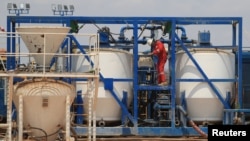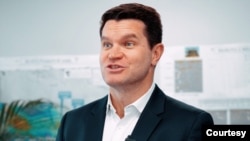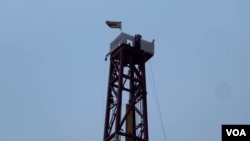Energy companies have discovered natural gas in northern Zimbabwe, near the country's northern border with Mozambique and Zambia. The Zimbabwean government hopes the discovery, if it can be exploited, will help reduce the need for expensive imported energy.
In a statement Thursday, Zhemu Soda, Zimbabwe’s minister of mines and mining development, described the discovery made in Cabora Bassa Basin, about 300 kilometers north of Harare, as “one of the most significant developments in the onshore oil and gas sector in the southern African region.”
Scott Macmillan, managing director of Invictus Energy, one of the companies exploring for gas and oil, spoke with VOA about the discovery.
"It’s obviously a significant development of the company’s history, we have successfully recovered a total of 400 carbon samples from two zones. This is the first triassic discovery in sub–Saharan Africa and one of the significant developments in the onshore oil and gas industry in onshore for many decades.”
Australia-based Invictus has about 360,000 hectares in the Cabora Bassa Basin to prospect for oil and gas. The equipment and data that Invictus and other companies are using to explore the area were left by the oil giant Mobil before it left the country in the 1990s.
With a rig contracted for another two years, Macmillan believes Invictus is well positioned for the future.
“It’s obviously a fantastic start,” Macmillan said of confirming a discovery from what is being referred to as Mukuyu 2. Mukuyu is one of the areas in the Cabora Bassa Basin that is being explored for gas and oil.
Mukuyu 2 is near Mukuya 1, a well that collapsed before explorers confirmed the presence of gas there.
“[It] opens up a significant resource potential which we have always believed in Mukuyu,” Macmillan said. “It’s a bright and exciting future ahead of us.”
Not everyone is happy with the $20 million gas and oil exploration project. Farai Maguwu, founding director of the Centre for Natural Resource Governance, fears the new project, if successful in capturing resources, could displace local people, destroy the environment and contaminate underground water.
He has a solution: renewable energy.
“There is business sense in investment in renewable energy,” Maguwu said. “They can supply cheap electricity which is clean and easy to install in rural areas and in urban areas. Today there is no difference. Actually, those in rural areas have got more energy sufficiency than those in urban areas because they have already turned to renewable energy.”
Zimbabwe has for years been facing energy shortages as the country largely depends on thermal and hydro equipment that cannot meet domestic needs.
With the discovery of gas in the Cabora Bassa Basin, Zimbabwe’s government hopes that situation will change.






